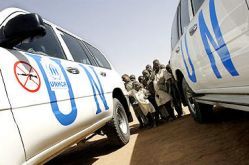Khartoum slams UN sanctions over Darfur as unfair, rebels want more
KHARTOUM, March 30 (AFP) — The Sudanese government reacted angrily to UN Security Council sanctions over atrocities in Darfur, but the rebels argued the move against Khartoum is too timid to yield a breakthrough in the conflict.

|
|
Internally displaced children between United Nations cars in Kalma camp near Nyala town in Sudan’s southern Darfur region, January 2005. (AFP). |
The move by the world body marked a new escalation in pressure on Khartoum to find a solution to the civil war in the western Sudanese region, where a British report said Wednesday that 300,000 people had died in two years.
The US-sponsored resolution passed on Tuesday was “unbalanced and inappropriate” and “ignored the government’s efforts in addressing the political, security and humanitarian aspects of the Darfur conflict,” a foreign ministry statement said.
The Security Council voted 12-0 to apply sanctions on individuals who commit atrocities or undermine peace efforts in Darfur, where government-backed militias and rebels have been fighting since February 2003.
The UN resolution adopted Tuesday, which allows for the seizure of assets and a travel ban against individuals who commit atrocities, impede the peace process in Darfur or “constitute a threat to stability.”
The Sudanese government hinted in its statement that it would not consider itself bound by the resolution.
“The government will also seek to lift any sanctions that the UN will impose based on false information,” it said. “The resolution unfairly puts the government’s rights and duties on an equal footing with the rebellion.”
The main rebel group in Darfur, the Sudan Liberation Movement, said it was disappointed by the scope of the sanctions, arguing they would do little to encourage the government to resolve the conflict.
The warring began in February 2003 when a rebellion in the vast western region was put down by government-sponsored militias which led a scorched-earth campaign against local civilians.
“We support the resolution, although we do not feel that it is strong enough,” SLM spokesman Mahjub Hussein told AFP.
He said his group had hoped for a resolution imposing additional sanctions on the government itself rather than individuals. “We wanted tougher sanctions against the government.”
The group said it would have preferred a resolution strengthening an arms embargo against Sudan, imposing restrictions on the movement of government officials and freezing their assets.
It also said the resolution would have carried more weight if it had obliged Khartoum to pull out its armed forces from Darfur and hand over security responsibilities in the region to an international force.
Under the resolution, backed 12-0 with abstentions from Algeria, China and Russia, any movement of military equipment and supplies into the Darfur region will require the prior approval of the Security Council.
The resolution also extended an arms embargo against non-state parties in Darfur to the Sudanese government and specifically prohibited Khartoum from offensive military flights into the region.
Violators will be identified by a new committee that will include all 15 Security Council members.
Meanwhile, a British report compiled by lawmakers who visited Darfur in February, revised upwards previous UN estimates of the death toll since the conflict broke out.
The report’s estimate of 300,000 deaths was almost double the figure of 180,000 mentioned earlier this month by the UN’s emergency relief coordinator, Jan Egeland.
“We think that is a conservative estimate,” said Tony Baldry, the chair of the House of Commons’ international development committee.
Sudanese authorities said Monday they had detained 14 people on suspicion of committing crimes in Darfur, nearly all of them members of the security services, saying they would all be tried at home.
They were the first confirmed arrests for Darfur crimes and analysts said they could have been orchestrated to preempt a Security Council decision on where to try the suspects.
So far, however, the council has been unable to agree on war crimes trials for Darfur and diplomats said Wednesday that the controversial vote had been postponed after a US request.
France and the United States have been at loggerheads over the venue for such trials.
Paris wants suspected war criminals to be tried in the International Criminal Court, but Washington opposes the Hague-based body and has proposed an ad-hoc tribunal in Tanzania instead.
